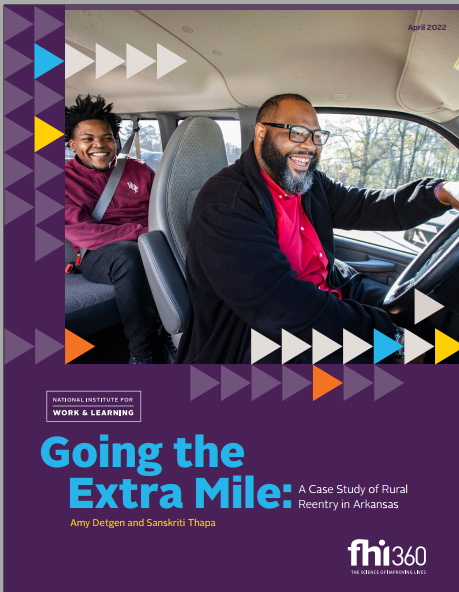Found 23 Results

FHI 360 Volunteer Training Catalog
FHI 360’s National Institute for Work and Learning (NIWL) provides a variety of resources and learning opportunities, including facilitated trainings and workshops, self-paced e-Modules, and toolkits, to help first-time volunteers—as well as those who would like a refresher—prepare for, engage with, and inspire youths. Read this catalog to learn more.

Second chances: Career coaching leads to fresh starts in Kentucky
For Second Chance month, we spoke to Olivia Murphy, who serves as senior career coach (and now youth program manager) for The Spot: Young Adult Opportunity Center in Louisville, KY. The story highlights how KentuckianaWorks navigates the challenges of life after incarceration, and how their impact encourages people to embrace second chances. Read the full […]

Breaking the Cycle: How Two YDPA Apprentices Are Healing Their Communities
“To me, that’s the biggest message with this apprenticeship — this is the perfect way to learn how to change lives.” As we celebrate National Apprenticeship Week 2024, we highlight two Lake County Youth Development Practitioner Apprentices who use their work to break the cycles of trauma and heal their communities: Luis Garcia Jr. and […]

National Institute for Work and Learning Apprenticeships
FHI 360’s NIWL Apprenticeships bring together experts in workforce development to expand existing nationally registered apprenticeship programs (RAPs), such as the Youth Development Practitioner Apprenticeship (YDPA) and develop new opportunities within the care economy such as youth services, peer support, substance-use counseling, and mental health counseling. Upon completion, apprentices receive a nationally recognized credential from […]

Peer Support Specialist Apprenticeship
As part of our Apprenticeship Programs, FHI 360’s Peer Support Specialist Apprenticeship partners with the Public Works Alliance (PWA) to train apprentices who have experienced recovery from personal and societal challenges. These include substance use disorder, PTSD, the re-entry process, and many other challenges. This shared experience enables apprentices to support others who are going […]

Substance Use Disorder and Mental Health Counselor Apprenticeship
As part of our Apprenticeship Programs, FHI 360 is partnering with New Ways to Work to develop a Substance Use Disorder and Mental Health Counselor Apprenticeship. This apprenticeship equips direct services employers with the resources they need to recruit workers with life experiences relevant to the communities they serve. Through a combination of paid on-the-job […]

Youth Development Practitioner Apprenticeship
As part of NIWL’s Apprenticeship Programs, the Youth Development Practitioner Apprenticeship trains apprentices in youth-supporting fields through 2,000 hours of on-the-job learning and 165 hours of coursework where they learn skills such as positive youth development, coaching, career case management and more. Upon completing the program, apprentices receive a nationally recognized credential from the U.S. […]

Compass Rose Collaborative Fact Sheet
The Compass Rose Collaborative (CRC) brings together FHI 360 and a cohort of partners that will serve justice-impacted youth in a holistic way. Through NIWL-designed training materials, a learn-and-earn working environment, and valuable mentorship activities, the CRC ensures that participants are equipped to thrive in their careers while minimizing further justice system involvement. Read this […]

The Advantages of an Intermediary Agency to Youth Reentry
Research highlights the benefits of collaborating with intermediary organizations for local reentry organizations and the justice-involved youth they serve. Read this resource for more information.

Going the Extra Mile: A Case Study of Rural Reentry in Arkansas
Going the extra mile: A case study of rural reentry in Arkansas provides an exploration of a rural community in southeast Arkansas that takes a unique, individualized approach to reentering young adults ages 18-24. The received wisdom on rural reentry is that it is generally more difficult than reentry in an urban setting. Phoenix Youth […]
